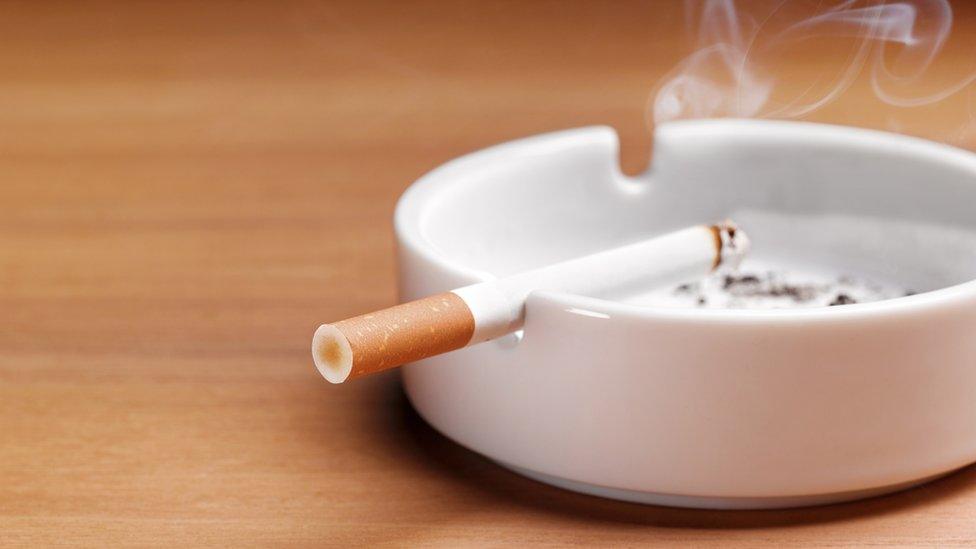New Zealand smoking ban scrapped: Will this affect the UK cigarette ban?
- Published
- comments

A smoking ban in New Zealand, that inspired a similar policy in the UK, has been scrapped by the new government in the country.
The law, designed to stop young people from smoking, would have banned cigarette sales next year to anyone born after 2008 in New Zealand.
Health experts in the country have strongly criticised the sudden change of plans.
Prof Richard Edwards, a public health expert at the country's University of Otago, said he was "appalled and disgusted," by the change in policy which he described as "world-leading" and "absolutely excellent health measures".
How is the UK smoking ban plan similar to New Zealand's?
Prime Minister Rishi Sunak proposed changes to the laws around smoking during a Conservative party conference earlier this year
New Zealand's laws are believed to have been an inspiration for the UK government's smoking ban plans.
In September Prime Minister Rishi Sunak announced that the government wants to make a similar law, raising the age people can buy cigarettes by one year every year "so that eventually no one can buy them" he said.
If his plans become law it would mean a 14-year-old today can never legally be sold a cigarette in the UK.
A spokeswoman for the prime minister said his position is unchanged despite New Zealand's change of plan.
According to the NHS smoking is one of the biggest causes of death and illness in the UK.
Why has New Zealand reversed the decision on the smoking ban?
New Zealand's previous Prime Minister Jacinda Ardern
The smoking ban law known as 'Smokefree' was introduced under the previous Prime Minister of New Zealand, Jacinda Ardern.
The country was thought to be the first nation in the world to pass a law that effectively banned smoking for future generations.
The policy meant that children aged 14 and under in the country would never be able to legally buy cigarettes.
But there was opposition to the ban from business owners in New Zealand, in particular newsagents and corner shops, whose owners were worried about losing money from cigarette sales.
New Zealand election
Chris Luxon (centre) is New Zealand's new prime minister
In February, Ms Ardern quit as prime minister of New Zealand and her Labour Party colleague Chris Hipkins replaced her ahead of the country's general election, which took place in October.
The New Zealand election ended in defeat for Mr Hipkins and Labour, with the opposition National Party taking enough seats to form a coalition - which is when two or more political parties temporarily work together as a government.
The new prime minister, National Party's Chris Luxon, had previously argued against the smoking ban suggesting it would force people to try and buy tobacco illegally.
However, the change in policy decision still came as a surprise to many in the country, because Luxon's National Party didn't mention a reversal of the law in any of their election campaigning.
National leader Christopher Luxon (4th L front row), Act leader David Seymour (3rd L front row) and NZ First leader Winston Peters (4th R front row) have agreed to form a coalition government in New Zealalnd
Announcing the decision new finance minister Nicola Willis said that during negotiations to form a government two smaller parties, ACT and New Zealand First, had insisted on the scrapping of the smoking ban before joining the National Party as a coalition.
The new government also said it needed to find a way to fund tax cuts in the country.
"We have to remember that the changes to the Smokefree legislation had a significant impact on the government books, with about a billion dollars there," Ms Willis told New Zealand broadcaster TV3's Newshub Nation.
But Prof Robert Beaglehole, chair of New Zealand's Action for Smokefree 2025 committee, said raising money through cigarette sales is wrong.
"The suggestion that tax cuts would be paid by people who continue to smoke is absolutely shocking," he said.
Research last year by New Zealand's Public health showed that the Smokefree policy would have saved New Zealand's health system about 1.3bn New Zealand dollars (拢630m) over the next 20 years.
New Zealand, a country east of Australia in the southwestern Pacific Ocean, has a population of 5.2 million people. Of those 331,000 smoke daily with 121,000 from New Zealand's indigenous M膩ori population.
Disease and health issues associated with smoking are highest among M膩ori people, with a national M膩ori health organisation, H膩pai Te Hauora, calling the decision a "blow to the health and wellbeing of all New Zealanders".
Currently, about 8% of New Zealand's adult population smokes, but more than 80,000 people quit the habit last year with the country still aiming to reduce its national smoking rate to 5% by 2025.
The Smokefree law still needs to be officially withdrawn through a vote in New Zealand's parliament, where the new government now has a majority of MPs (Members of Parliament).
- Published5 October 2023
